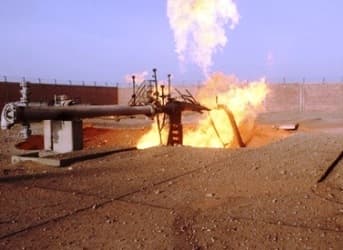The very shape of the Middle East is changing right before our eyes. Libya got rid of its dictator, as did Tunisia and Egypt. These three countries in North Africa are still trying to find themselves politically speaking. We have all seen the pain Egypt is suffering through on its path to political maturity. Similarly, Syria is transitioning, albeit at a much more violent pace, as is Iraq and to a certain degree, Lebanon, too.
And just as the geopolitical map of the Middle East is changing, so too are the weapons of choice. If you will recall, during the 1970s and 1980s, the preferred target of terrorist groups, or as some people prefer to call them “revolutionary groups,” used to be the airplane.
In order to propel their message, groups -- call them terrorists or freedom fighters – would hijack civilian airliners in order to make their voices heard. That however, with the exception of the four planes hijacked on September 11, 2001 by al-Qaida, hijacking civilian airliners had become a thing of the past. It had become passé, not to mention difficult given the increased security at airports.
So terrorists had to find a new target, preferably a “soft” target. That would allow them to achieve their goal without having to jump through the hoops needed to brag command of an airplane.
Looking around it is not difficult to realize that there are a good number of “soft” targets that can achieve multiple results at the same time, all while minimizing the risks involved to the group carrying out the attacks. And those are oil installations.
Related article: Terrorism: The Latest Salvo on LNG Exports
Oil installations come in many shapes, sizes and forms. Some are easy to secure, as for example a refinery, despite the contents of its easily inflammable product. Enlarge the security perimeter widely enough and that should prevent most portable weapons from reaching it.
Of course there is always the probability of attacking a refinery with larger calibre weapons, but then it becomes a major military campaign, rather than a covert guerrilla act. There are oil fields which are somewhat more difficult to police and protect, but nevertheless, with remote cameras, infrared sensors and all the other sophisticated hardware available securing oil fields becomes far simpler.
Somewhat more complicated to secure are oil platforms stuck out in the middle of the sea somewhere, where under the cover of a stormy night the noise generated by outboard engines could be drowned out by the storm.
But there is one other type of oil installation that makes it an easy target for the terrorists/rebels/freedom fighters and one that is very difficult to secure oil pipelines.
Lets’ get a little technical:
There are two types of pipeline: oil and natural gas, each one having subsets serving different purposes, such as in the oil category there are pipelines for crude oil and for refined products. Crude oil pipelines are further subdivided into gathering lines and trunk lines.
Gathering lines are typically small pipes measuring anywhere from two to eight inches in diameter. There are approximately some 30,000 to 40,000 miles of such pipelines, located mostly in the United States, in Louisiana, Oklahoma, Texas and Wyoming. Additional lines are found in smaller oil producing states. These lines gather the oil from the wells on land as well as off-shore, and then connect to larger trunk lines. Those measure eight to 24 inches in diameter.
Related article: Iraqi Oil Exports Slump But Optimism Abounds
Among the trunk lines are some larger than others, such as the Trans Alaska Pipeline System, measuring 48 inches in diameter.
Bringing the crude to the refineries are these larger pipes of which there are about 55,000 miles of crude in the United States alone. Pipelines often supply major industries and airports.
Next comes the refined pipelines; those vary from eight to 12 inches. In the US alone there are 95,000 miles of pipelines in nearly every state.
Now consider these: the East-West Pipeline, 5,410 miles going form Xinjiang to Shanghai (both in China) on Kazakhstan’s Caspian Sea to China.
ADVERTISEMENT
Gasun Pipeline in Brazil, 3,100 miles; Yamal-Europe Pipeline, 2,608 miles.
And there are a number of others through which oil and natural gas are transported throughout the Middle East, the Caucasus and Arabia, tens of thousands of miles of pipelines. Given the terrain and the distance they cover it is impossible to secure every mile of these hundreds of thousands of miles.
A number of groups, such as the PKK, the Kurdish Workers Party has taken to attacking the pipelines at various locations. The result is that first it gives the group media attention it craves, then it hurts the host country’s economy. And the terrorists don’t have to worry about going through metal detectors.
By. Claude Salhani
Claude Salhani is editor of ArabSpringNow.com. and author of several books on the Middle East. His latest book is an e-book, Inauguration Day, is a novel dealing with terrorism.


















